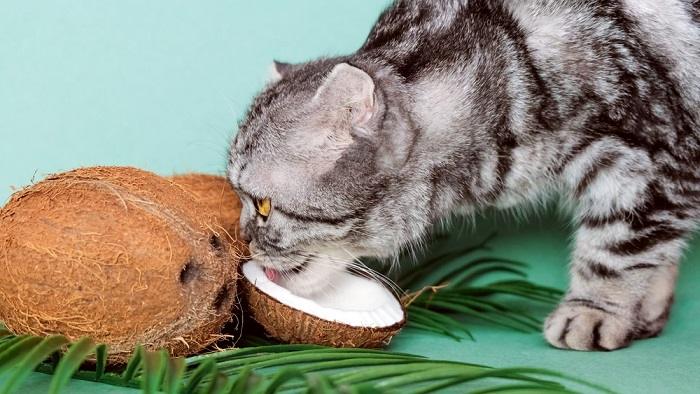
As one of the major ‘superfoods’ that nature has to offer, coconut oil can be beneficial for humans in a number of ways for everything from cooking to treating dry skin, to even boosting immune system function.
But when it comes to pets – and specifically cats – does coconut oil offer the same great perks or could using it actually do more harm than good for kitties over time?
We break down some of the pros and cons of using coconut oil on cats below.
Is Coconut Oil Good for Cats?

Using coconut oil for everything might seem like just a fad right now, but the truth is, this oil has some solid advantages for cats, and its popularity isn’t likely to change.
Coconut oil comes from the meat of matured coconuts. After it’s been extracted, that oil can get processed in a number of ways.
Extra virgin coconut oil – a.k.a the kind we’d most strongly recommend for cats and humans – is usually considered the best. That’s because it hasn’t been hydrogenated (meaning chemically processed) and it’s basically the purest form of the oil available.
Because coconut oil is made from medium-chain fatty acids, humans can digest it easily and even convert that edible oil into energy while in the body, which is where all those terrific health benefits also come in to play.
Coconut oil has been shown to help moisturize skin, reduce the symptoms of hypertension, improve immune function, and even help the body maintain cholesterol levels.
It can also be an excellent source of healthy saturated fats.
Can Cats Have Coconut Oil?

Coconut oil is 100% fat, 80-90% of which is saturated fat
Humans might not have any issues digesting coconut oil, but can the same be said for cats? There’s plenty of anecdotal evidence to suggest that coconut oil can actually be extremely beneficial as a holistic remedy for cats.
One of the most common uses for coconut oil with cats is for treating atopic skin allergy, helping promote healthy skin and fur in cats. It can be used topically or orally to bring much-needed nutrients to afflicted areas.
Because coconut oil is also naturally antimicrobial and anti-inflammatory, some recommend using it on open wounds and to prevent bites from parasites or fleas.
Also Read: Best Flea Treatment for Cats- Knock Out Fleas With These Safe Treatments
Some also recommend using coconut oil for cats with inflammatory bowel disease, since it could help improve their overall health.
Is Coconut Oil Safe for Cats?

According to petmd.com, coconut oil may benefit a cat’s immune system
Using coconut oil to improve your cat’s health could end up being great in a number of ways. However, there are some disadvantages to using it that are crucial to keep in mind.
Will coconut oil hurt cats? Since coconut oil is high in saturated fats, it could be harmful to cats with or at risk for developing pancreatitis, say some experts.
Adding it to a cat’s diet in a consistent way could potentially increase this risks, which is why applying the oil topically may have more advantages for pets, especially if they’re in an area that they can’t lick.
Coconut oil is also featured in the ASPCA’s roundup of foods to avoid feeding pets, since the milk and flesh from fresh coconuts could lead to an upset stomach, loose stools, or even diarrhea for cats.
Also Read: Best Cat Food for Sensitive Stomach
But the organization also notes that these risks only apply when the oil is consumed in large amounts on a regular basis.
Another potential risk factor to keep in mind about coconut oil? It’s extremely high in calories and could lead to unwanted weight gain, especially in cats that are already on the heavier side.
Benefits of Coconut Oil for Cats

Although there are some risks to keep in mind before giving your cat coconut oil, for some pet owners the pros of using it far outweigh the downsides.
Coconut oil promotes better digestion, incorporating coconut oil into a cat’s diet can potentially alleviate constipation by providing a natural source of lubrication for the digestive tract.. Applying coconut oil on your cats’ paws can help moisturize and soothe dry or cracked paw pads.
Other benefits include:
- Application of coconut oil on a cat’s fur can contribute to a shiny and healthy coat.
- Massaging coconut oil into a cat’s skin can be effective in reducing dandruff by moisturizing and nourishing the skin.
- Serve as a natural hairball remedy by promoting smooth digestion and potentially reducing the formation of hairballs.
If you’re eager to add coconut oil to your cat’s routine, there are a number of ways you can do it right at home. Be sure to consult with a veterinarian, since making significant changes to your cat’s diet or routine can have a big impact on their overall health and should never be done without professional advice first.
How Much Coconut Oil for Cats?
It’s generally recommended to start with a conservative amount of coconut oil, such as 1/4 teaspoon per day, gradually increasing to 1/2 teaspoon for adult cats. However, individual tolerance may vary, and it’s crucial to monitor for any signs of digestive upset or intolerance, adjusting the dosage accordingly
What Kind of Coconut Oil Is Best for Cats?
Opt for natural, unrefined, and virgin coconut oil for cats, as it retains more of its natural properties. Ensure it is free from additives and preservatives. Start with a small amount, gradually increasing as needed, and consult your veterinarian to confirm its suitability for your cat’s specific health circumstances.
Also Read: Best Cat Food
Ready to start putting this secret weapon to good use for your cat? Consider a few of the options below to incorporate this edible oil into your pet’s regimen today.
- Use it as a moisturizer. Coconut oil can work wonders on skin, especially when it’s dry. Massage a dollup of coconut oil into your pet’s skin and not only can you help reduce the look of dry itchy skin, but you can also help make their fur shinier and softer to the touch.
- Prevent hairballs. For long-haired cats that naturally struggle with hairballs, coconut oil can be a good natural remedy since you can feed it to them directly and it functions as a non-petroleum based lubricant. Most cat experts recommend introducing coconut oil slowly into a cat’s diet. According to PetMD, giving average-size cats anywhere from ⅛ to ½ teaspoon once or twice a day can be ideal, but you may want to start off slowly in case your cat has an allergic reaction.
- Treat mild gingivitis. Gingivitis, or inflammation of the gums, is a common oral disease in pets that can cause discomfort and lead to long-term dental health issues. According to experts, rubbing coconut oil on gums could help reduce pain and support better gum wellness for cats.
- Use it as a topcoat. If you like to take your cat out for walks on a leash, you know that their paws can get exposed to all kinds of things, especially damage from little rocks and potentially salt. Apply a thin coat of coconut oil to your cat’s paws and it’ll actually serve as a good top-coat, protecting sensitive skin.
- Improve cognitive function. According to some experts, coconut oil might help enhance brain function in geriatric cats since it’s rich in medium-chain triglycerides (MCTs), which have been clinically shown to help boost brain energy metabolism.
- Heal wounds. For open cuts or other scratches that cats might have, coconut oil could help prevent infections and help wounds to heal faster than they otherwise would, and bring peace of mind to pet owners in the process.







